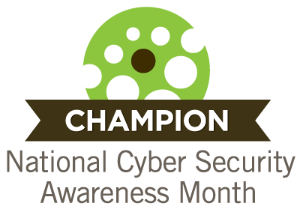...
| Tip | ||
|---|---|---|
| ||
|
| Anchor | ||||
|---|---|---|---|---|
|
| Info |
|---|
Sign up as 2017 NCSAM Champion now and More than 200 colleges and universities joined join EDUCAUSE, Internet2, and the REN-ISAC as a champion in support of the higher education community! Over 100 colleges and universities have signed up so far and showed their support as official NCSAM champions in 2017. You can also share your plans for events, activities, or training sessions during the month of October by sending us an e-mail. |
2017 Campus Events & NCSAM Champions
- Austin Peay State University
- Azusa Pacific University
- Baker College
- Baylor University
- Binghamton University
- Board of Regents of the University System of Georgia
- Boise State University
- Broward College
- Bryn Mawr College
- California Lutheran University
- California Polytechnic State University
- California Western School of Law
- Carnegie Mellon University
- Central Washington University
- Chapman University
- Claremont University Consortium
- Clark College
- Connecticut College
- Cornell University
- County College of Morris
- DeSales University
- Drake University
- Duquesne University
- El Paso Community College
- Florida Atlantic University
- Grinnell College
- Indiana Tech
- Indiana University of Pennsylvania
- Indiana University-Purdue University Columbus
- Johns Hopkins Bloomberg School of Public Health
- Kennesaw State University
- Lafayette College
- Lehigh University
- Lone Star College
- Mercer University
- New Mexico State University Doña Ana
- Pepperdine University
- Pomona College
- Princeton University
- Quinnipiac University
- Raritan Valley Community College
- Richard Bland College
- Rochester Institute of Technology
- San Antonio College
- South Arkansas Community College
- Temple University
- Texas A&M University
- University of Arizona
- University of Arkansas
- University at Buffalo
- University of California, Davis
- University of California, Los Angeles
- University of California, Merced
- University of California, Office of the President
- University of California, San Diego
- University of California, San Francisco
- University of California, Santa Barbara
- University of California, Santa Cruz
- University of California, Riverside
- University of Findlay
- University of Illinois, Springfield
- University of Indianapolis
- University of Iowa
- University of North Carolina, Chapel Hill
- University of North Georgia
- University of Northern Colorado
- University of Oregon
- University of Professional Studies, Accra
- University of San Diego
- University of Tennessee Health Science Center
- University of Tennessee Institute of Agriculture
- University of Virginia
- University of Washington, Bothell
- Utica College
- Valparaiso University
- Villanova University
- Wayne County Community College District
Champion registration for 2018 will be available on the National Cyber Security Alliance website in May. |
| Anchor | ||||
|---|---|---|---|---|
|
What is Cyber Security Awareness?
...
National Cyber Security Awareness Month is an annual effort to increase awareness and prevention of online security problems, spearheaded by the U.S. Department of Homeland Security and the National Cyber Security Alliance (NCSA). The Higher Education Information Security Council (HEISC) promotes and participates in the annual campaign each October, joining forces with a range of organizations from the public and private sector to expand cybersecurity awareness on campuses across the country. HEISC offers many resources made by and for information security professionals in higher education.
- NCSAM Resource Kit and NCSAM Sample Kit
- Information Security Awareness Video & Poster Contest for Students
- Cybersecurity Awareness Resource Library
- EDUCAUSE Security Awareness Resource Page
...
The following NCSAM Planning Guide worksheet (PDF or Word) will help you to think about how your institution might go about implementing a plan to take advantage of National Cyber Security Awareness Month. You can also use the Annual Campus Security Awareness Campaign, which includes a printable 2016 calendar with monthly security awareness topics and 12 blog posts on the monthly topics with ready-made content for your campus communication channels.
Texas A&M University tries to create cybersecurity awareness campaigns that engage students in security education. For six years, they have created awareness campaigns featuring online cybersecurity games that entice more than 10,000 campus members to participate and that number continues to grow each year. Learn more about their planning process by reading their May 2017 guest blog: Bridging the Gap Between Students and Security: 7 Steps to Creating a Successful Cybersecurity Campaign. Indiana University offers a NCSAM Sample Kit with creative materials based on a 1950's horror theme, and outlines plans for their use that you can adapt to your institution's needs quickly. You can pick and choose which materials will best help you to increase your community's security awareness. Some of the materials are even provided in Spanish. These materials were created and used at Indiana University for National Cyber Security Awareness Month 2005. Indiana University grants permission for non-profit educational use, as long as the credit line and the copyright statement remain on the materials.
The winning posters and videos from previous Information Security Awareness Video & Poster Contests are available for use in campus security awareness campaigns during student orientation, National Cyber Security Awareness Month, Data Privacy Day, and throughout the year.
...
